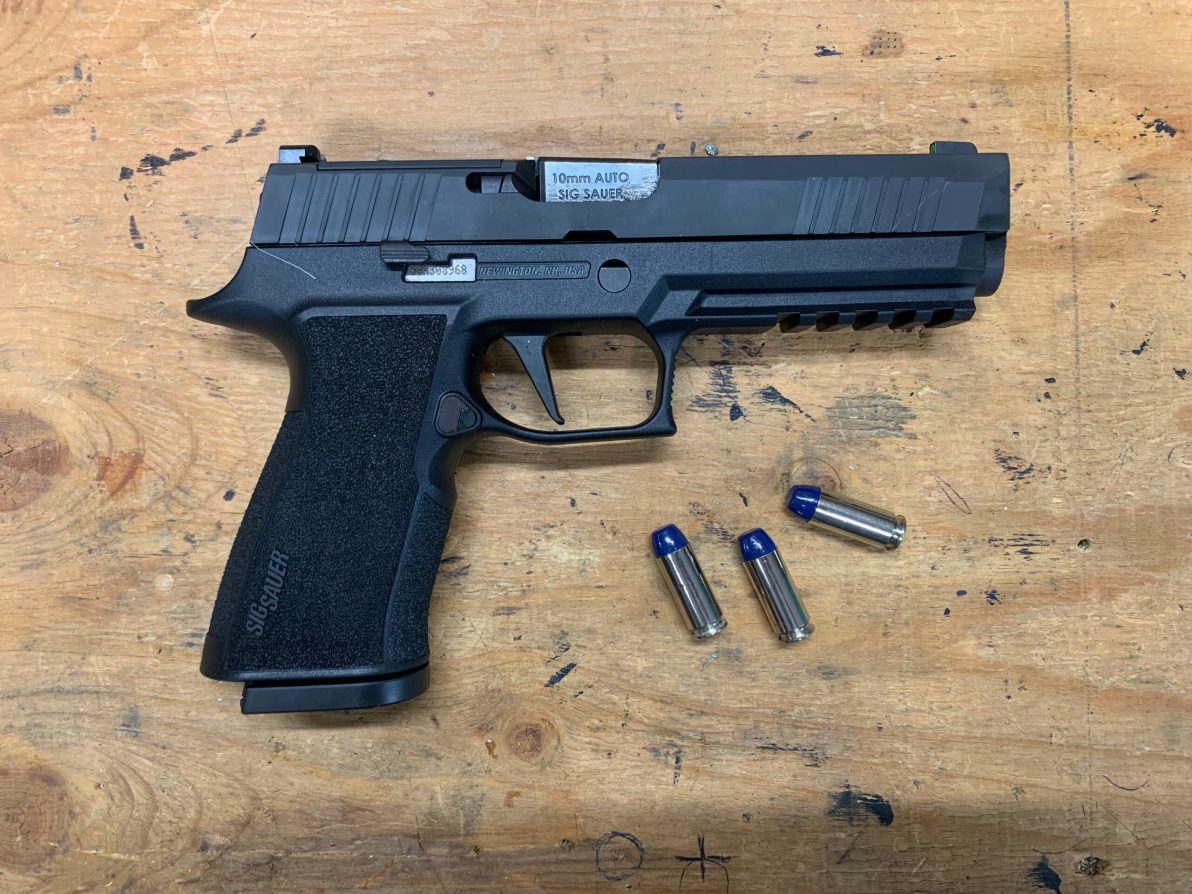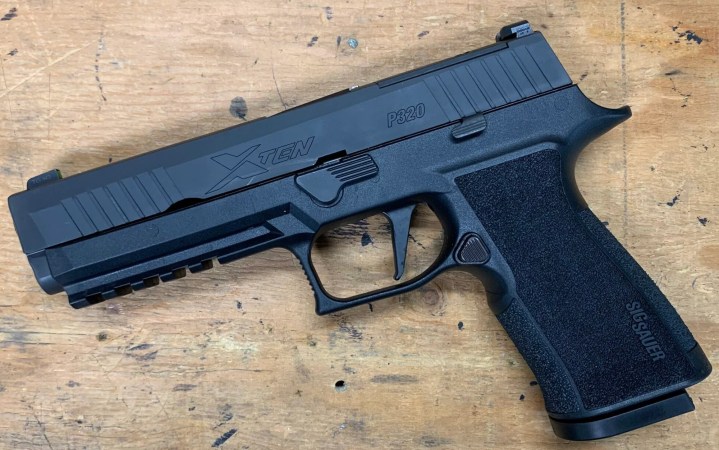We may earn revenue from the products available on this page and participate in affiliate programs. Learn More ›
Sig-Sauer is a juggernaut when it comes to new product introductions, and the P320 XTen is one of several 2022 releases. The XTen isn’t Sig’s first 10mm pistol, but it is their first striker-fired double-stack 10mm. The Sig XTen is an upsized variation of the popular P320 line, most of which are chambered in 9mm. Aside from micro-compact 9mm pistols, one of the hottest segments of the semi-auto handgun market lately has been 10mm pistols. The cartridge that almost went nowhere is now more popular than ever—particularly for backcountry carry. The Sig P320 line is popular and versatile, and it makes sense for them to develop a 10mm version. Just how well does the Sig P320 XTen stack up against the competition? That’s exactly what I wanted to find out.
Double-Stack 10mm’s for Backcountry Defense
Led by the Glock G20, double-stack 10mm pistols have become sought after for one primary purpose—backcountry defense. Although big revolvers chambered in .44 Mag, .454 Casull, and others are still relatively popular, there’s been an enlightening. Those big smoke wagons are a pain in the ass to carry, tough for the average person to use proficiently, and still don’t deliver the power of even medium-sized rifle cartridges. Further, they’re much more expensive and difficult to practice with than 10mm pistols that mimic the ergonomics of familiar 9mm pistols.
The 10mm is less powerful than big revolver cartridges, but with proper solid bullets, it will penetrate adequately to be a reasonable defense against bears. It’s easier and cheaper to shoot, more convenient to carry, and most 10mm pistols have ergonomics similar to those of 9mm models. Another benefit of double-stack 10mm pistols is their dramatically larger capacity than revolvers and single-stacks. Many 10mm models used to be 9-round 1911-style single-stack pistols, but polymer-framed double stacks offer nearly twice the capacity at 16. Some will argue that extra capacity will never benefit you in a bear defense situation, but they’re flat-out wrong. I’ve seen first-hand how quickly four or five rounds can evaporate (even from a rifle) when dealing with a less-than-ideal bear situation, and I don’t want to be left needing more.
A double-stack 10mm pistol for backcountry defense should ideally be capable of holding at least 15 rounds, be comfortable and intuitive to shoot, capable of hosting a tactical light, and not overly cumbersome to carry.
Sig-Sauer P320 XTen Specs
- Caliber: 10mm Auto
- Magazine Capacity: 15+1
- Magazine Material: Carbon steel body, polymer baseplate
- Dimensions: 5.6 inches (H) x 8.5 inches (L) x 1.3 inches (W)
- Weight: 33.1 ounces (measured)
- Frame: Black Polymer, 5-slot accessory rail
- Slide: Stainless steel, black Nitron finish
- Barrel: 5-inch, carbon steel, supported chamber
- Sights: X-Ray 3 tritium 3-dot sights, steel
- Optic: Cut for Romeo2/Trijicon RMR-pattern optic forward of rear sight
- Trigger: 4 pounds, 13 ounces (measured)
- Safety: None
- Retail Price: $799
The Sig-Sauer P320 and P320 XTen
In recent years, Sig has been rolling out popular handguns left and right, staying competitive in both full-size and compact markets. The popular Sig P365 series is constantly being updated, and they also dropped their new P322 this year (you can read our review here). The P320 series is derived from the Sig P320 M17 that is now the U.S. Army’s primary sidearm.
The standard P320 is a striker-fired pistol chambered in 9mm, with a polymer frame and 4.7-inch barrel. The standard grip is slightly rounded and has a 17+1-round capacity. One unique feature on the P320 is its fire control unit. It’s easily and completely removable for cleaning and maintenance.
There are around 25 variations of the P320 in 9mm, with different colors, barrel lengths, frame sizes, grip contours, and frame materials. Most parts are interchangeable between pistols of the same caliber, and you can buy customized and improved fire control units for a better trigger pull. The Sig P320 XTen is one of few P320’s that are in a different caliber, and the only 10mm Auto.
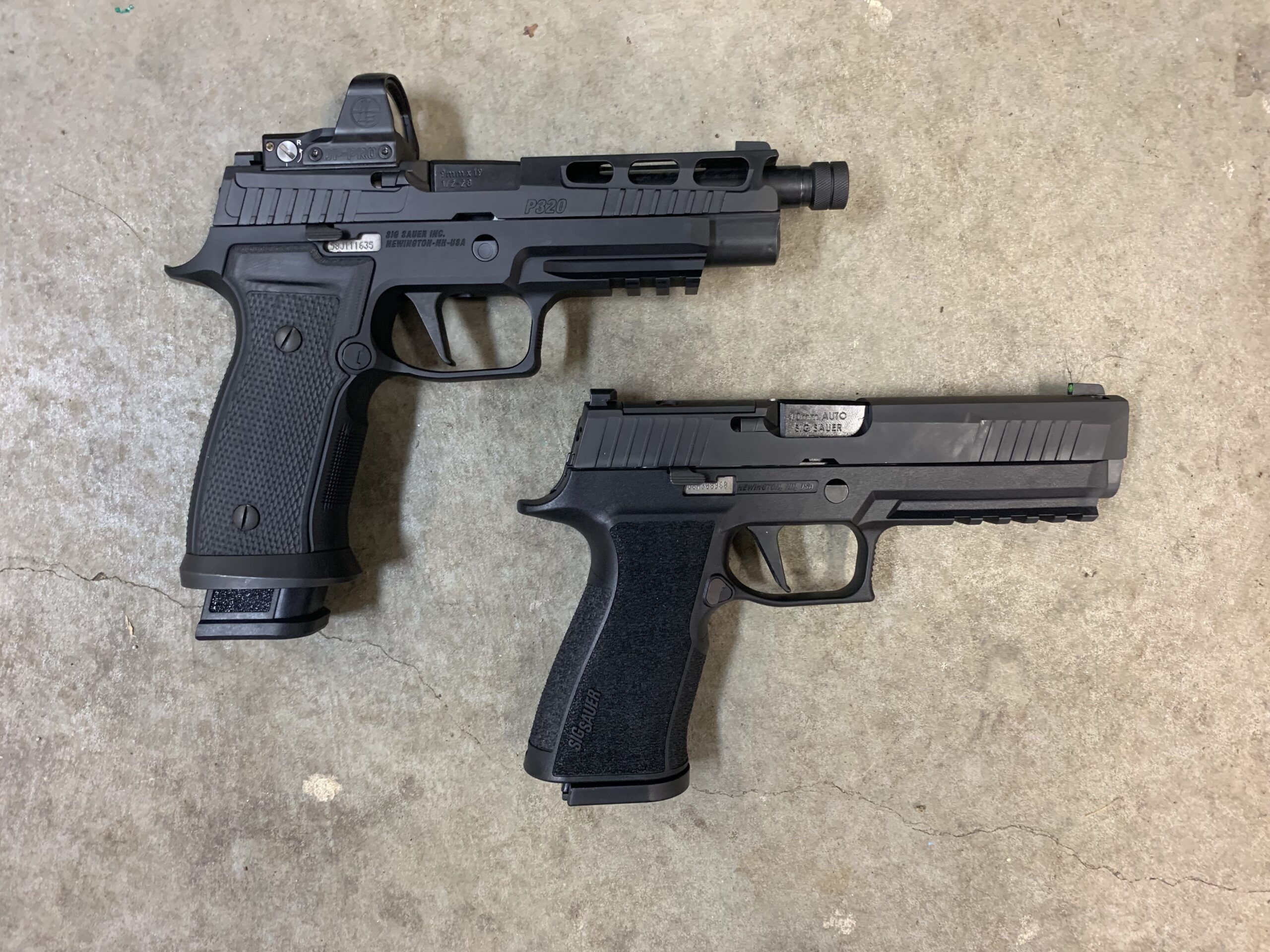
Nuts and Bolts of the Sig-Sauer P320 XTen
The first thing to note about the P320 XTen is that it is, in fact, a P320. Sure, it’s chambered in the larger 10mm Auto, but aside from necessary upsizing of the magazine well and barrel, and a stiffer recoil spring, there really isn’t much that’s different than the full-size 9mm versions.
External dimensions are essentially the same, and the slide assembly will fit and dry function on a 9mm frame. They’re not interchangeable because the difference in magazine size, and Sig says that only .45 ACP P320 parts are compatible to shoot. However, overall size and fit are the same. This is notable because on many 10mm pistols that are part of a bigger line (like the Glock G20), almost everything is up-sized from the 9mm models.
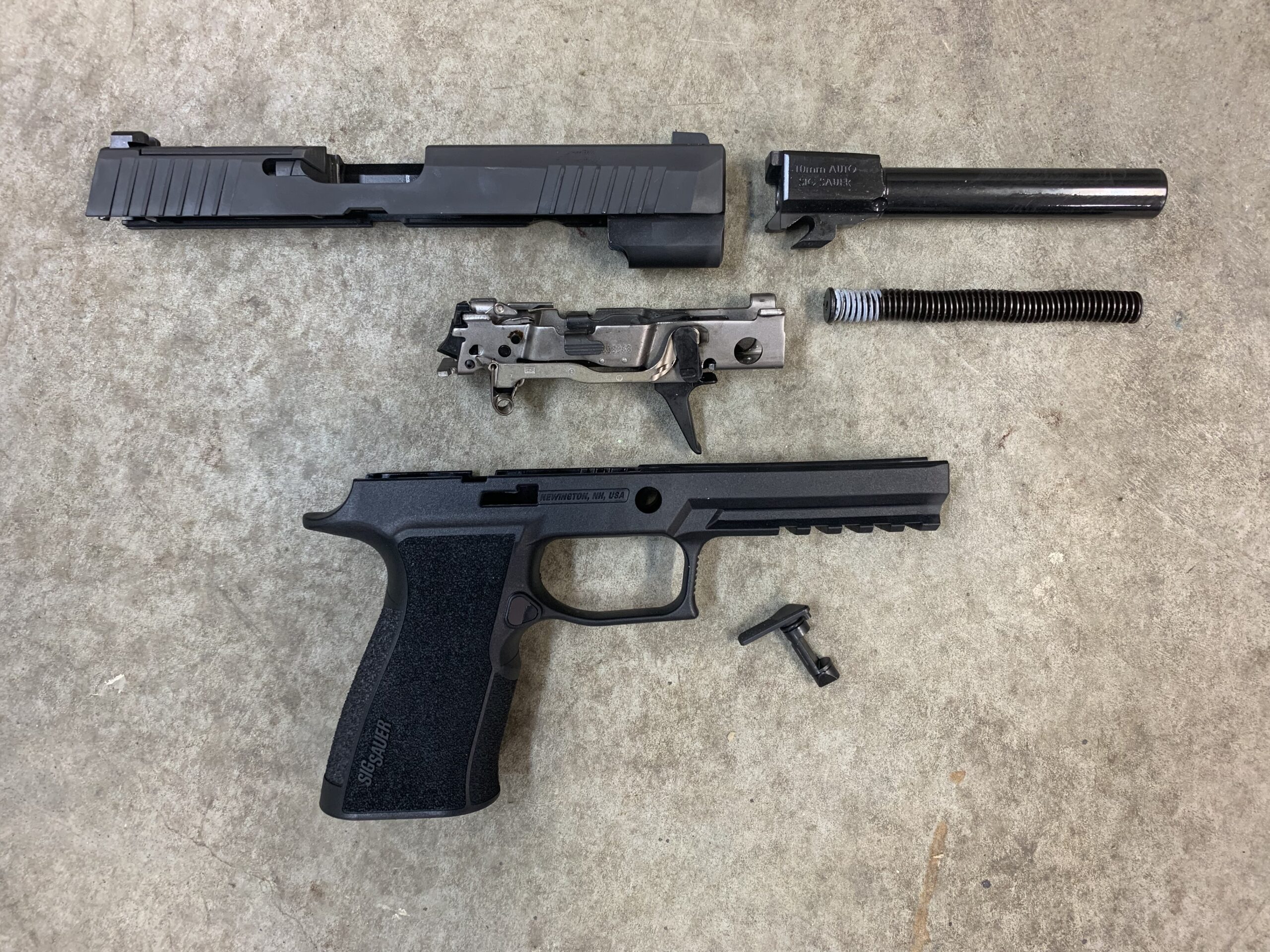
Grip Module
The Sig P320 XTen has a full-size frame or “grip module” that’s of the “X-Series” variation. Rather than the rounded grip profile of the M17/M17, the grip is contoured with an undercut-like groove just below the trigger guard. The sides of the grip are flat, and it has a pronounced beavertail. The front, back, and sides of the grip have a stipple texturing that’s abrasive, but not too aggressive.
The frame has an extra-long five-slot accessory rail. I consider a rail-mounted light an absolute necessity for a backcountry defense gun, and there is plenty of room to mount one here.
Fire Control Unit
Like other P320’s, the fire control unit (FCU) can be easily removed by pulling out the takedown lever and lifting the assembly from the frame. This is helpful for cleaning or upgrading the FCU if you choose to do so. I swapped FCU’s with one of my P320’s in 9mm and it appears to be exactly the same except the 9mm version’s slide stop tab prevents it from being used interchangeably with the 10mm version. Like other X-series FCU’s, it has a flat trigger shoe that breaks at 90 degrees.
Unlike many other pistols, the four slide rails are actually part of the FCU, not molded into, or permanently attached to the frame. There are two rails at the front, and two at the rear. At the rear-most position of the recoil cycle, the slide contacts a steel surface at the front of the FCU. I’m a fan of this. The contact surface between frame and slide on the popular G20 is polymer, and I’ve seen those polymer tabs rip off the frame after lots of heavy use.
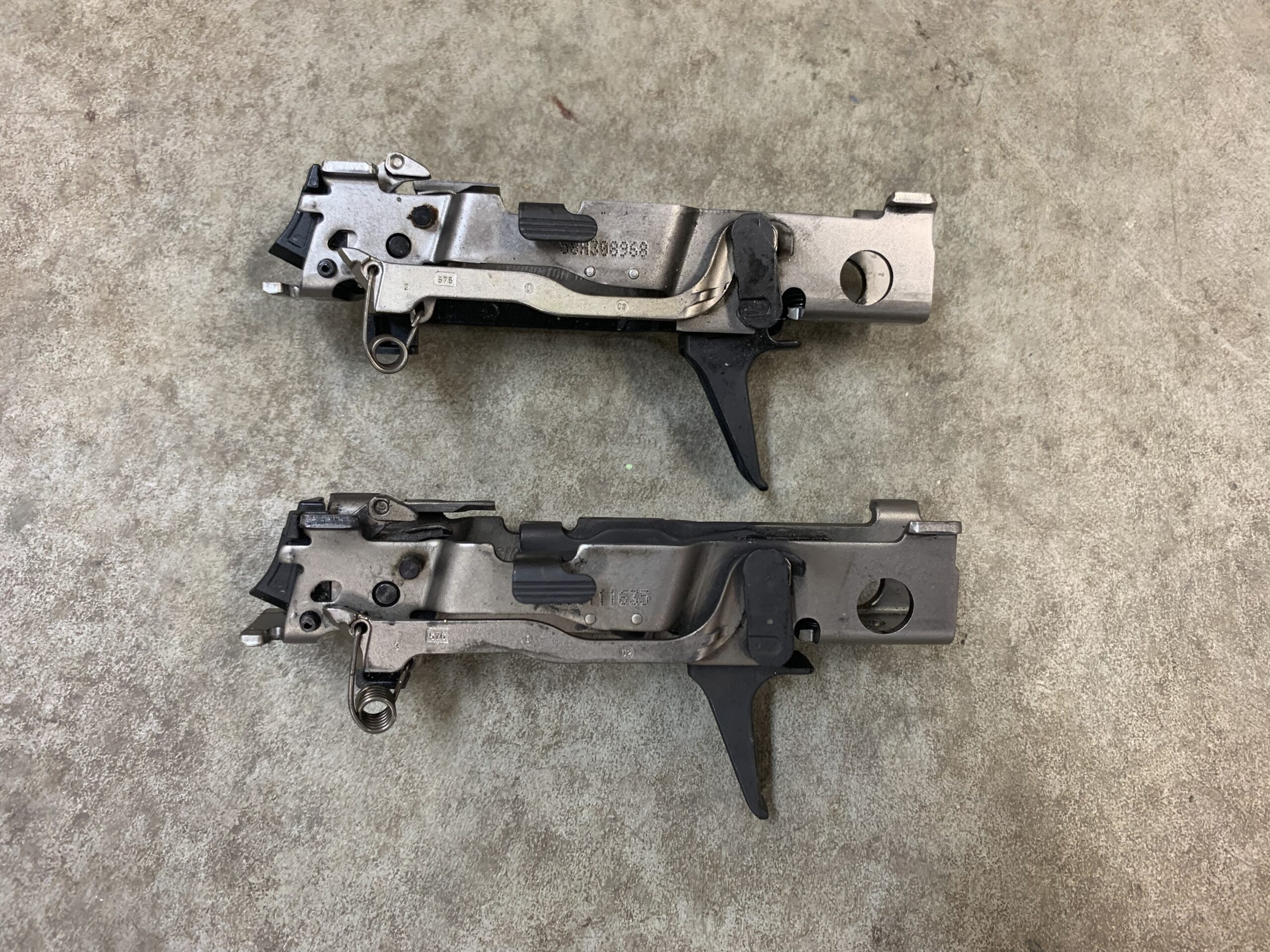
Slide and Barrel Assembly
The XTen’s slide is stainless steel and coated with a black Nitron finish. It has forward and rear cocking serrations and comes with steel 3-dot tritium night/day sights. Just in front of the rear sight is a plate covering the optics cut. The Slide is cut to be compatible with a Sig-Sauer Romeo2 or Trijicon RMR reflex sight.
The slide houses a simple striker assembly, as well as an externally visible, robust extractor. The pistol has a captured recoil spring/guide rod assembly, but spring weight isn’t listed.
The Sig XTen has a 5-inch barrel, which is longer than the G20’s 4.6-inch barrel. They call it a “bull barrel,” but it’s pretty much standard weight for a 10mm. It’s only about .004-inch thicker-walled than the Glock G20’s stock barrel. The 5-inch barrel will certainly give a little more velocity than shorter barrels, but the difference isn’t as pronounced as you’ll see with revolver cartridges. Across a variety of full-house 10mm loads, I’ve seen only about a 75-100 fps velocity difference between 5-inch and 3.8-inch barrels.
The XTen also has a well-supported chamber. A fully supported chamber means that the chamber completely surrounds the case wall. Most semi-automatic pistols have a bevel cut into the chamber at the top of the feed ramp that helps ensure reliable feeding. That bevel usually leaves some of the case wall exposed. Older Glocks had a reputation for getting ruptured cases in high-pressure 10mm loads. Although the current G20 barrels have better chamber support than they used to, they aren’t quite fully supported. Neither is the XTen, but it’s close. The case encapsulation of the P320 XTen’s barrel is comparable to my Lone Wolf aftermarket 10mm barrel.
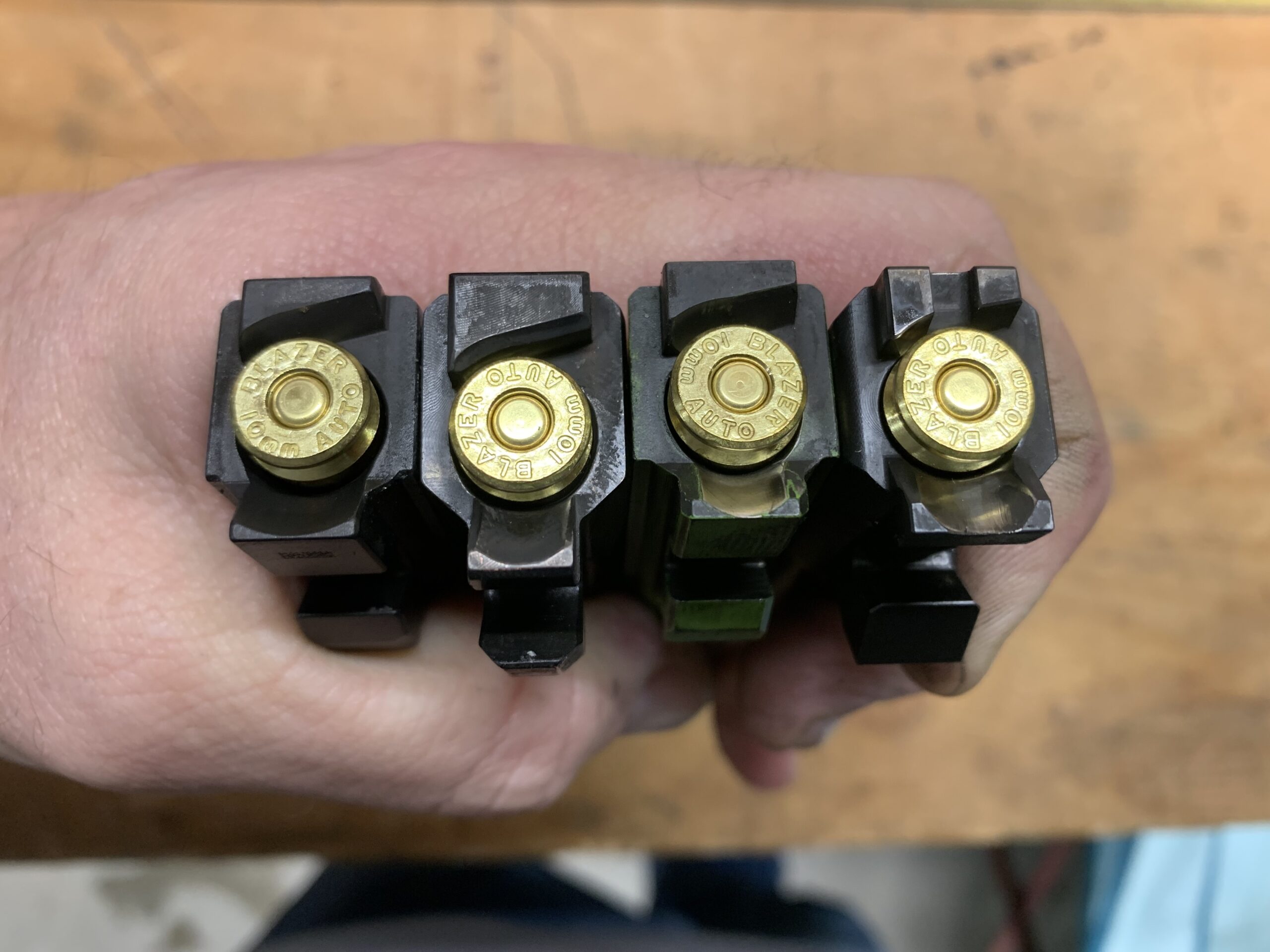
Shooting the Sig-Sauer P320 XTen
To test the Six P320 XTen, I fired over 400 rounds through the pistol, focusing on both slow-fire accuracy and recoil manageability in rapid fire. About half of the shooting was holster work and shooting at 40 and 25 yards on a half-size USPSA/IPSC steel plate. The other half was fired indoors at 25 and 50 feet, alternating with several other 10mm pistols.
A Superb, Comfortable Grip
To manage the increased recoil of a 10mm pistol well, the grip needs to be comfortable and maintainable. To cut straight to the point, the XTen has the most comfortable grip on a 10mm pistol that I’ve fired. That is partially a matter of preference, but I find the vertically oriented and petitely-contoured X-series grip to be quick-pointing and easy to hang on to. The XTen has essentially an identical-feeling grip as my P320 AXG in 9mm—a pistol I shoot well. Although the grip texture isn’t the most aggressive that I’ve seen on a 10mm, it’s good, and the beavertail on the frame lets the shooter choke up on the grip.
Manageable Power
I spent lots of time shooting the XTen alongside several other 10mm pistols, such as a stock Glock G20, a Lone Wolf G20 clone, and my Springfield 3.8-inch compact XD-M 10mm. Everything is measured against the G20 in the 10mm world, and I found the XTen to be comfortable and controllable. The XTen has slightly snappier recoil than the stock G20, but not as stout as the felt recoil of the Smith & Wesson M&P2.0 10mm or my G20 Clone.
I credit the G20’s win in this aspect to a lower bore axis, and beefier grip. Overall, the XTen’s grip is more comfortable for me to hold, faster to point, and easier to get a repeatable grip out of the holster than the G20. However, the larger surface area of the G20’s frame seems to make a good grip easier to maintain once established—primarily with the support hand. The recoil of the XTen was just enough to cause some movement in my support hand against the left side of the frame. I’d have to slightly re-position my grip after a few shots.
Read Next: Types of Pistols, a Beginner’s Guide
Overall, the Sig-Sauer XTen is one of the most comfortable and controllable 10mm Auto pistols that I’ve shot, even with full-power defensive loads like Federal Premium 200-grain HST hollow points, 200-grain Solid Core Syntech, and Buffalo Bore Heavy Outdoorsman.
My only gripe with the pistol’s handling and function is that the fully loaded 15-round carbon steel magazine requires a substantial tap to click it securely into place. The first rack of the slide to chamber a round out of a full magazine is also rough and a little slow. This isn’t uncommon with some other 10mm’s, but compared to my 9mm P320’s, it’s tight. This could be a function of maintaining the 9mm external proportions while using a larger 10mm barrel and magazine. The 9mm variants require little effort to achieve a secure magazine lockup, and smooth operation when chambering the first round.
Increasing Control With a GoGun Gas Pedal
A notable aftermarket aid that is compatible with the P320 XTen is the GoGun Gas Pedal. I first tried one on my Springfield XD-M compact 10mm and couldn’t believe how much it helped reduce muzzle jump. It’s the same story with the XTen. After doing stock-parts comparisons, I replaced the takedown lever with a Gas Pedal, and just having that tiny bit of purchase for my support hand thumb eliminated any play in my grip due to recoil and kept my sights level and on-target through the entire shot cycle.
Some folks look at the Gas Pedal as a gimmick or attempt to bypass a good and proper grip on the gun. It’s not. With a good grip, it simply helps the shooter apply more pressure with their support hand to counteract recoil. Poor grip? It will do nothing. It may or may not be for you, but it’s certainly worth trying.
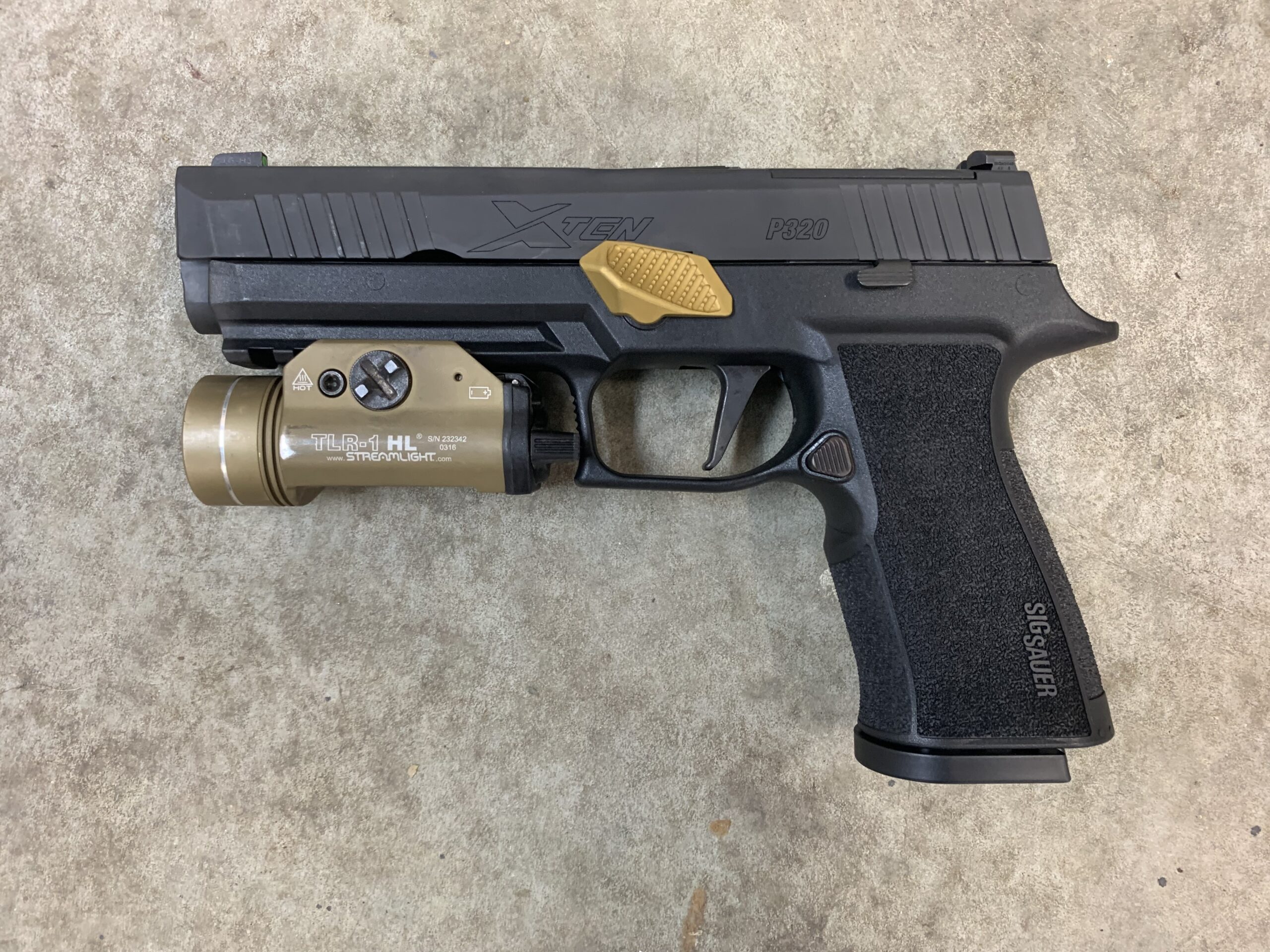
A Good Trigger and Practical Accuracy
The XTen isn’t intended to be a bullseye pistol, and I didn’t test it as such. I found it to be accurate enough for defensive purposes and could keep on-average four of five rounds on a Post-it note at 50 feet from a supported position. From the holster, I could easily repeat offhand hits at 40 yards on my half-size USPSA/IPSC steel plate.
While shooting faster strings of fire at a USPSA/IPSC target at 50 feet, I could maintain A-zone hits, especially when using the Gas Pedal. When switching back to the Glock G20, I found that I pushed my impacts to the left due to the Glock’s rougher, stiffer trigger. The XTen’s trigger has some creep, which is typical for striker-fired pistols, but it breaks clean at just under 5 pounds. Comparatively speaking, the 8-pound, 10-ounce stock trigger on the G20 I have is awful.
Read Next: Best 9mm Ammo
The Sig P320 XTen is Reliable
In firing over 400 rounds through the Sig-Sauer P320 XTen and didn’t experience a single malfunction. First rounds chambered sluggishly when racking from a fully loaded magazine, but the pistol had no function failures. I fired mostly Remington UMC and CCI Blazer Brass FMJ ammo, which isn’t loaded to full 10mm pressures, so I also shot approximately 100 rounds of several types of full-power 10mm loads including Federal 200-grain HST and solid core, Hornady Handgun Hunter, Buffalo Bore Heavy Outdoorsman, Grizzly Cartridge, and Underwood Extreme Defender.
I did notice that the bore accumulated visible lead fouling when shooting hard-cast bullets. Glocks are notorious for lead fouling due to the shape of the rifling, but I would be sure to brush and clean out any 10mm bore after shooting cast lead bullets before you switch back to jacketed. Better-yet, just shoot mono-metal bullets like the Lehigh Defense Extreme Defense, or Federal’s Syntech-jacketed Solid Core ammunition.
What the Sig-Sauer P320 XTen Does Well
The XTen has great ergonomics and handling characteristics, and it’s comfortable and controllable to shoot. It’s compatible with a variety of lights, the aftermarket Gas Pedal takedown lever, and comes with good factory sights. It’s optics-ready, and anyone who likes the P320 series pistols in 9mm will love this one.
Where the Sig-Sauer P320 XTen Could do Better
I’d like the full magazines to seat more easily (like the 9mm P320’s), and I think they could have stayed with a 4-inch or 4.5-inch barrel and made it a little more compact without sacrificing performance.
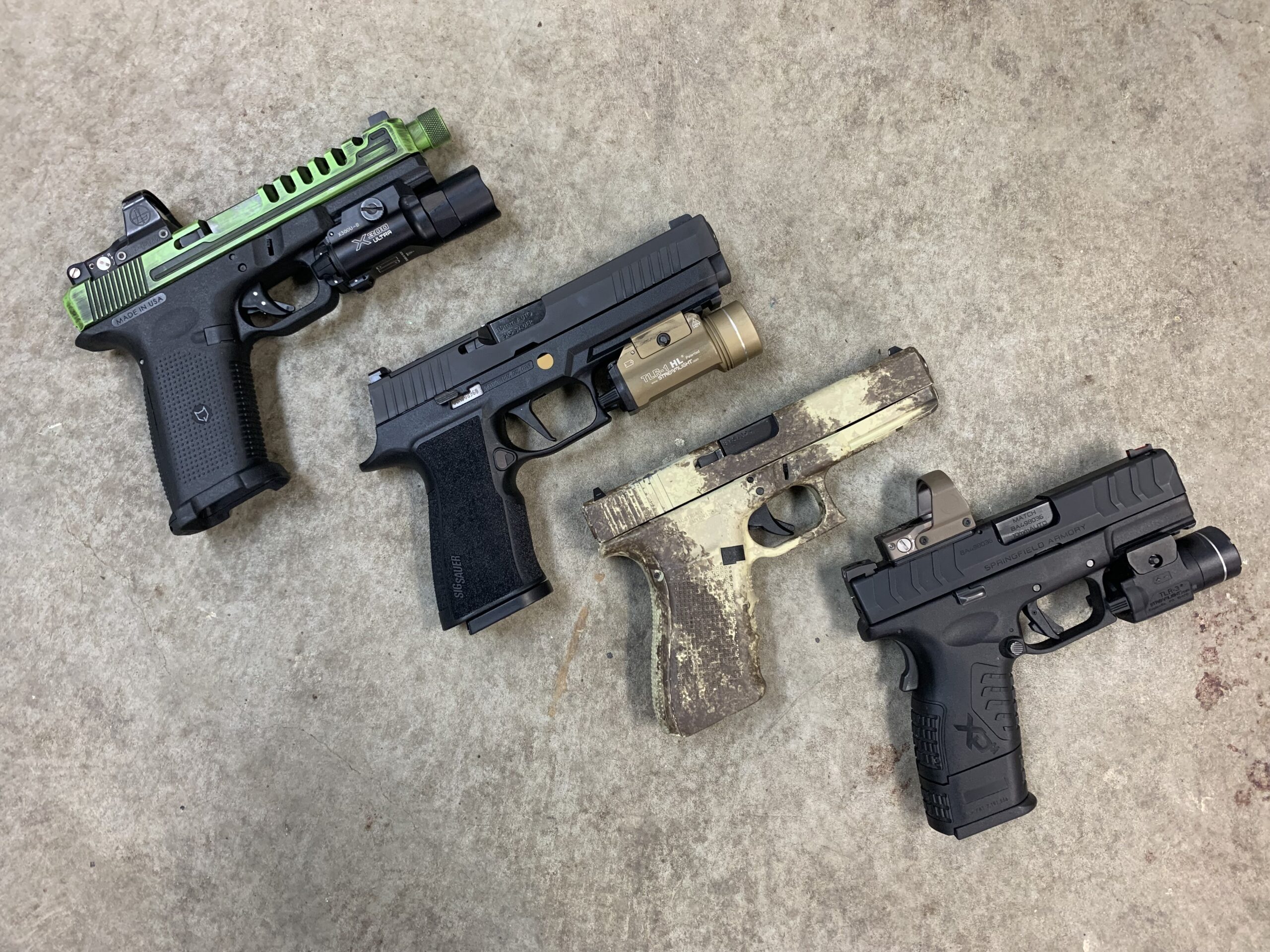
Final Thoughts on the Sig-Sauer P320 XTen
Variety and competition drive incremental improvements in any product. Having another good 10mm pistol on the market is wonderful to see, and this pistol helps move the ball forward. A few short years ago, the G20 was the only full-capacity option for folks who wanted a 10mm to shoot or carry in the backcountry. That’s not the case anymore.
I have no qualms about recommending the XTen. I’ve found it to be reliable, well-built, and one of the most comfortable 10mm pistols to shoot. The XTen has exactly the same ergonomics as other full-size X-series P320’s, and similar trigger pull and geometry to even the small P365. It would ride well in a chest holster and deliver in every relevant category for backcountry carry. I wouldn’t say the XTen is the best 10mm option for everyone, but if you already prefer Sig pistols, or just shoot them well and want a 10mm, this is where I’d start.
